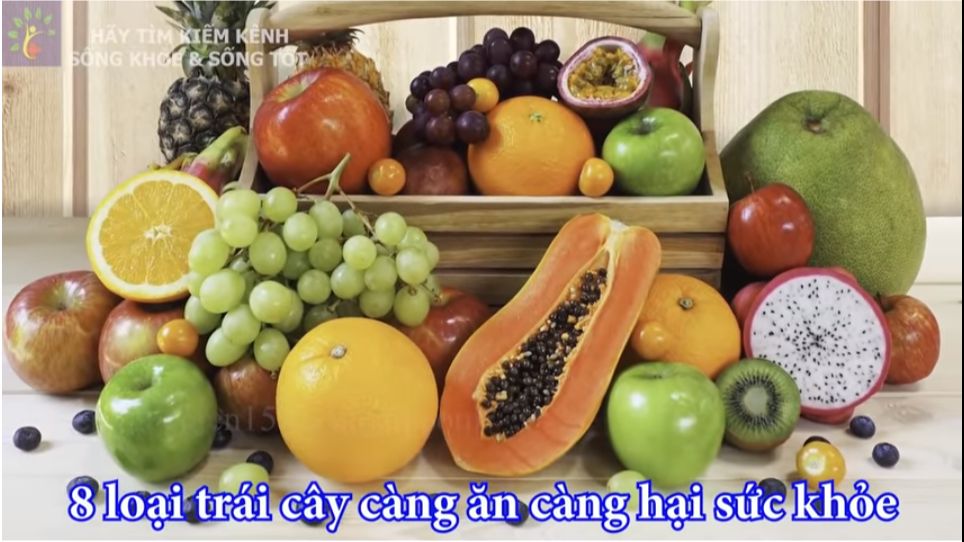8 types of fruits that are harmful to health when eaten excessively.
1. Orange
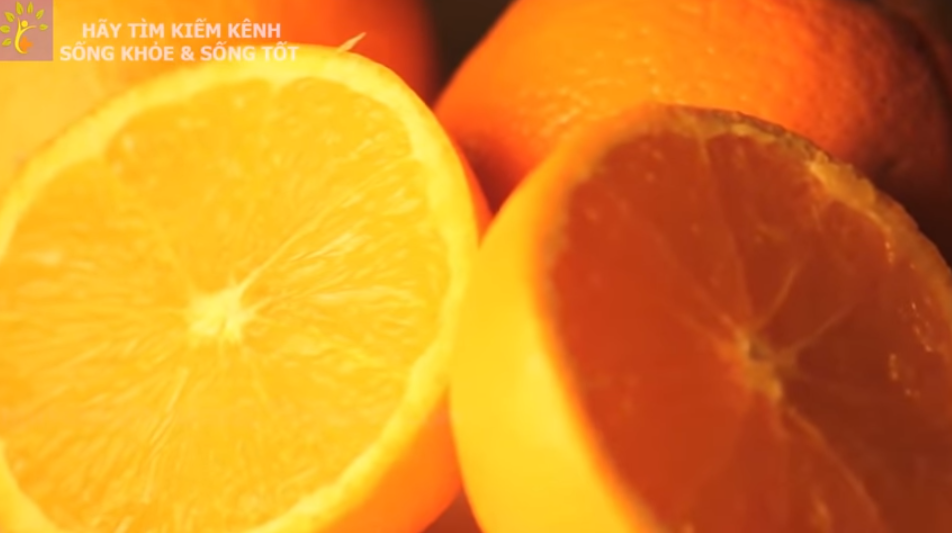
Many studies have shown that consuming oranges in large quantities increases the risk of kidney stones more than normal. The main reason comes from the abundant vitamin C in the juicy orange segments that can increase and precipitate oxalate stones in the urinary tract, so you are at high risk of kidney stones if consumed excessively for a long time. In addition, excessive consumption can be harmful to teeth and increase blood sugar levels, especially it is not advisable to eat oranges on an empty stomach because orange juice can stimulate the stomach lining strongly affecting the normal digestive absorption of the stomach.
2. Banana

If you eat too many bananas, you may experience headaches because bananas contain tyramine, phenyl ethylamine, and amino acids that can dilate blood vessels and increase blood flow to the brain, leading to headaches. Especially ripe bananas have a higher tyramine content, meaning that the riper the banana, the more likely you are to get a headache when you eat it. Therefore, it is best to eat bananas when they are not too ripe and in moderation. Also, although they contain a rich amount of vitamin B6. However, if consumed in excess, this amount can cause nerve damage and numbness in the hands and feet, and an excessive amount of vitamin B6 in the body can lead to toxicity. People with asthma should not eat bananas in their diet, as it can also cause inflammation and allergies, making breathing difficult.
3. Plums
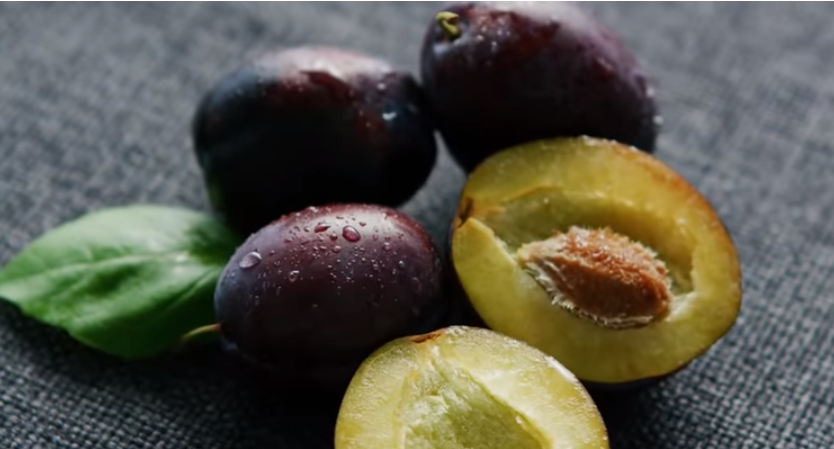
According to Associate Professor Dr. Nguyen Thi Lam, plums have a high acid content. If consumed in large quantities, the stomach and tooth enamel will be significantly damaged, especially in children whose stomachs are not yet stable and tooth enamel is easily affected, so eating too many plums can be a disaster. Plums have a high heat nature for people with a hot constitution, if you eat too many plums at once, you are more likely to get pimples, mouth ulcers, especially pregnant women with a hotter body temperature than normal, especially should not eat too many plums as it can cause rashes, harm the health of both the mother and the fetus.
In addition, plums contain a lot of oxalic acid, which interferes with the body's calcium absorption process, which can lead to kidney stone formation, the main cause of kidney stones and bladder stones, so you should not eat too many plums. For people with kidney disease or a family history of kidney disease, it is best to avoid plums completely.
4. Watermelon
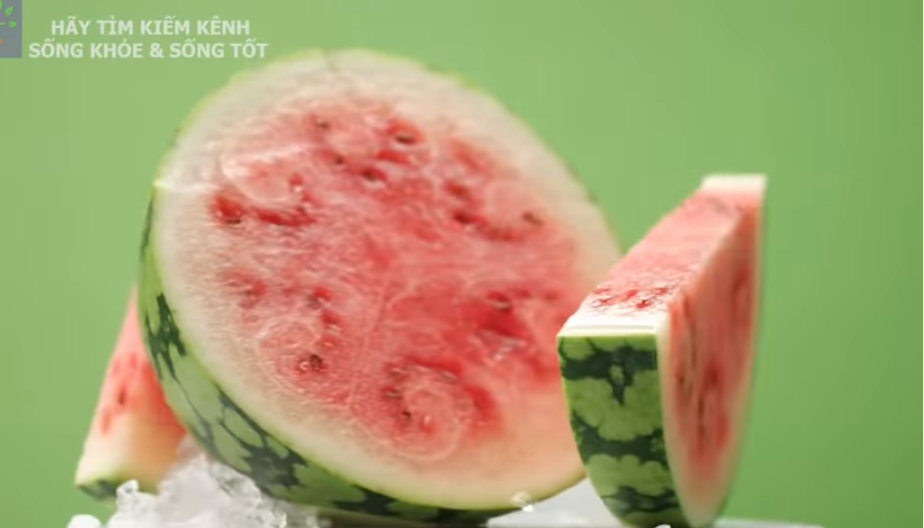
Watermelon is a fruit that effectively quenches thirst and has many great health benefits. However, this type of fruit is cold in nature, so you should not eat too much as it can cause bloating, diarrhea, and loss of appetite. Another reason not to eat too much watermelon is that 94 percent of watermelon flesh is water, so eating too much can dilute stomach acid, causing indigestion and affecting the body's digestive function, especially for those with poor digestion or nocturnal urination and gastrointestinal disorders, should not eat too much watermelon. Also, if you eat too much watermelon, the high potassium content can disrupt heart rhythm and the central nervous system, causing abnormal heart pain.
5. Persimmon
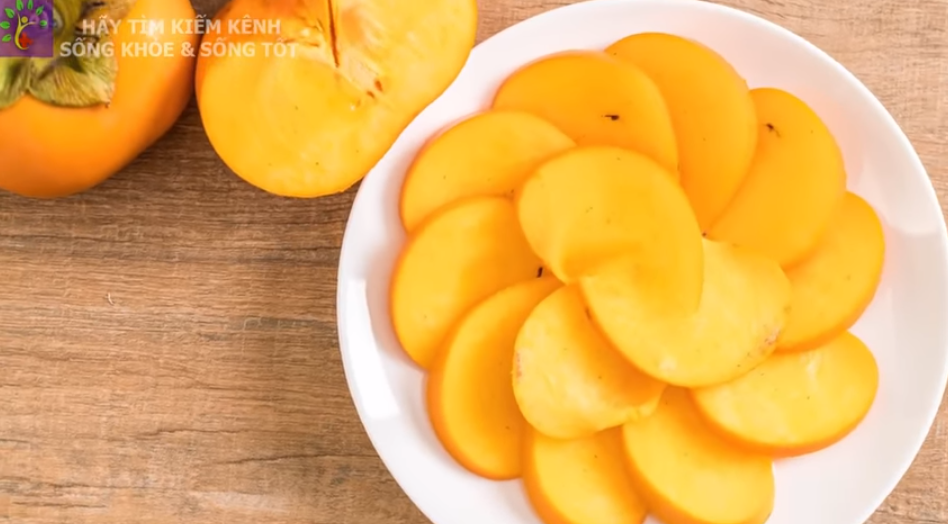
Persimmons contain tannins, astringents, and pectin. When eaten unripe, people often feel astringent. Tannins and pectin are substances that harden the intestinal mucosa, affecting bowel movements. Eating too much, especially when hungry, the tannins, pectin, and high fiber content in persimmons, 100 grams of persimmons contain 2.5 grams of fiber, will solidify under the action of stomach acid, making it difficult to digest, and may even cause nausea and vomiting.
Eating too much can form a mass in the small intestine, leading to intestinal obstruction. When eating, do not combine with foods high in protein, which can slow down digestion, making it easier to form food blockages. Especially for the elderly with weak teeth, poor chewing, reduced bowel movements, and salivary gland function, eating persimmons will slow down bowel movements even more, making food prone to forming lumps into food debris. When unable to be expelled, it can cause intestinal obstruction.
6. Cherry
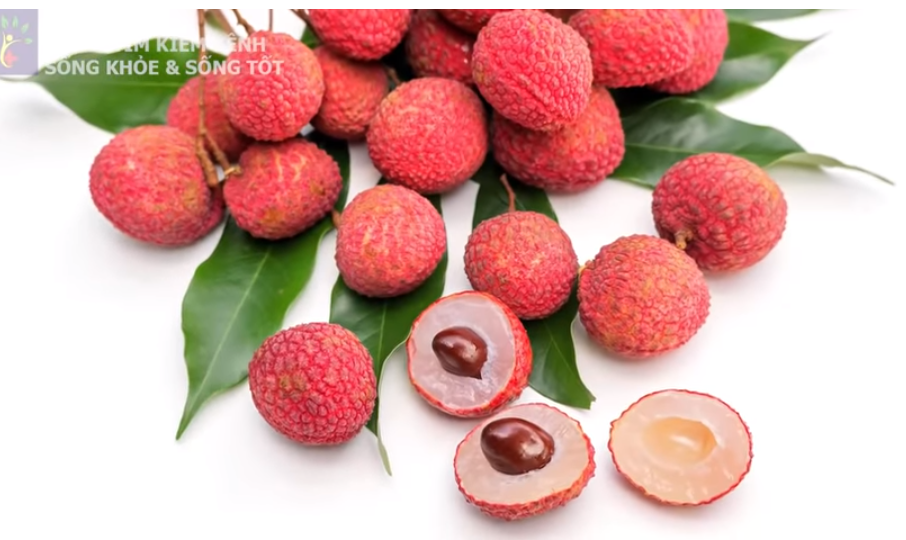
Cherries also help to give a smooth, pink, and smooth skin when consumed in moderation, but for those who are prone to allergies, coughs with phlegm, or have hives, cherries become very dangerous when eaten. Because it will make the condition worse and can cause complications. Cherries have a very high sugar content, so eating too many cherries will increase blood sugar levels, affecting health. Therefore, people with diabetes and pregnant women should not eat too many cherries, even for normal people, eating too many cherries can cause dizziness, nausea.
7. Longan
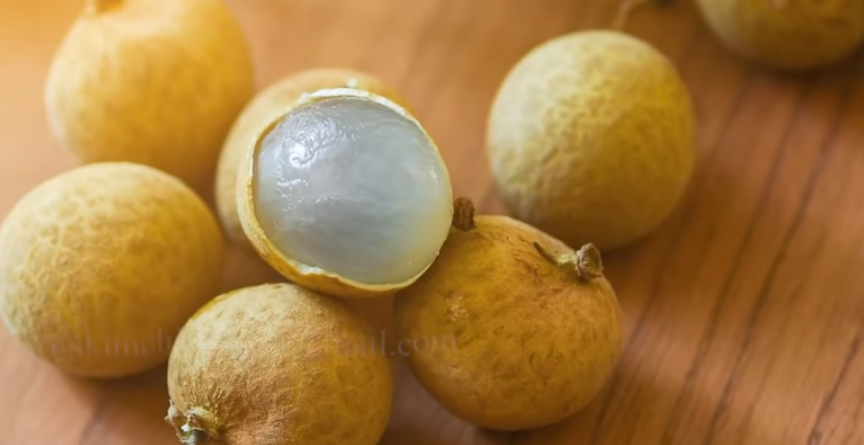
Longan is a fruit that generates a lot of heat, so eating too much will make the body heat up, causing pimples, increased hair growth, and worsening constipation, especially for those who are prone to constipation. Therefore, the toxins accumulated in the body for a long time without being excreted can also affect health. In addition, pregnant women with weak health, heat in the body, or constipation, bitter mouth should not eat too many longans as it will disrupt normal development, leading to bleeding, abdominal pain. Besides, longan is also a fruit with a large amount of sugar, consuming too many longans can increase the sugar level in the body, causing weight gain.
8. Peach
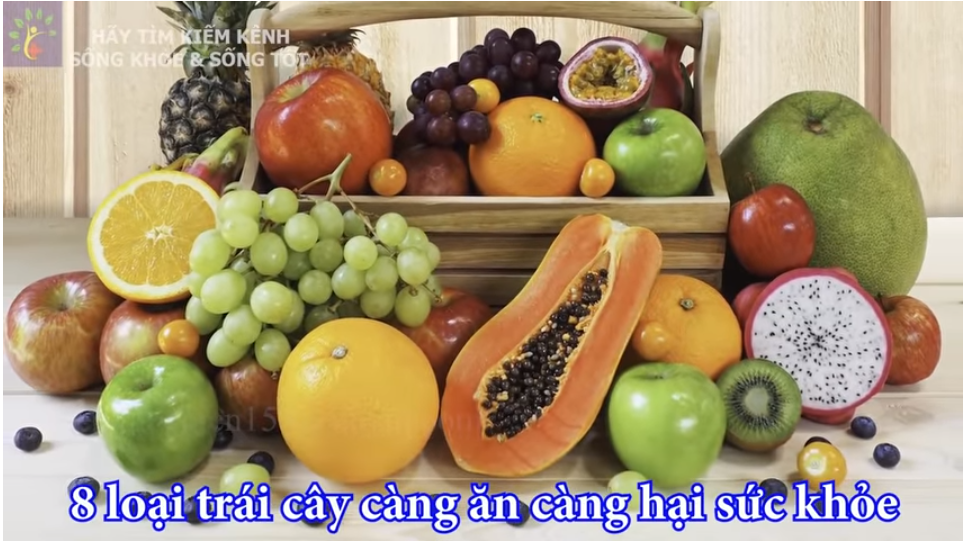
Peaches contain many essential nutrients for the body such as iron, protein, sugar, zinc, pectin. However, this is also a type of fruit with a high heat-generating nature. If pregnant women eat too many peaches, it will increase the risk of bleeding, moreover, if not peeled, the outer fuzzy part can cause itching in the throat.
Fruits are essential for the body as they contain a large amount of vitamins and minerals. However, some fruits and vegetables, when combined, can cause health problems. Combining incompatible foods can cause indigestion, acid reflux, stomach pain, nausea. And here are the types of fruits and vegetables that are incompatible, you need to pay attention to when combining them to preserve all the nutrients in fruits and vegetables and ensure the best for health.
Incompatible fruits and vegetables
1. Tomato and cucumber
Cucumbers and tomatoes are very nutritious and many people have the habit of preparing them together, such as making salads. However, not many people know that one of the major contraindications of tomatoes is this fruit. The reason is that cucumbers contain a catabolic enzyme that will destroy the vitamin C content in other vegetables, while tomatoes contain a large amount of vitamin C. If you eat these two foods together, the vitamin C in tomatoes will be destroyed and broken down by the catabolic enzymes in cucumbers. Therefore, when using these two at the same time, the nutrients in them will be greatly reduced.
2. Mango and banana
Mango should not be eaten with bananas because they are the same type of starch. Starch is metabolized into sugar, which is then converted into fat. Eating too much starch if the body does not excrete it will be absorbed and accumulated in the liver, causing dangerous diseases such as cirrhosis or liver cancer. Another group of fruits that are not good when eaten together are kiwi with apples, oranges with grapefruits, because they contain too much potassium, which makes the kidneys work harder.
3. White radish and various types of pears, apples, grapes
Many people often want to combine white radish with fruits to create a healthy juice. However, you should never combine white radish with pears, apples, or grapes. According to research, the copper content in these fruits will react with cyanide acid from white radish, which can cause symptoms of goiter, severe thyroid dysfunction, such as when drinking this half-breed often.
4. Eating bananas with potatoes, sweet potatoes
Potatoes are rich in carbohydrates, while bananas are rich in carbohydrates and sugars, which are not suitable for overweight people or those who need to control their starch intake. Combining these two foods can make the body have excess energy and easily fall into a state of fatigue and lethargy.
5. Bananas and watermelon
Watermelon contains a high sugar content of up to about 15 percent and is very rich in potassium, while bananas are also very rich in potassium with a concentration of about 300 to 500 grams per 100 kg. Therefore, patients with kidney failure should not eat fruits with high potassium content such as bananas and watermelon. High potassium levels in the blood can cause heart rhythm disturbances. Also, do not eat bananas with milk as it will cause bloating and is not good for digestion.
6. Persimmon and sweet potatoes.
The starch in sweet potatoes stimulates the stomach to secrete acid, the action of tannin and pectin in persimmons will form stones in the stomach. Over time, it can cause gastric ulcers and bleeding.
7. Sour fruits such as oranges, lemons with cow's milk
Cow's milk contains a lot of protein, with casein accounting for up to 80 percent. Mixing or drinking cow's milk with sour fruit juice makes casein coagulate and settle, causing digestive disorders. Sour fruit juice also has an acidic nature that alters the properties of cow's milk, making it difficult to digest, thus affecting the body's digestive system.
8. Pineapple and milk
Pineapple contains bromelain, a digestive enzyme that breaks down protein in milk, combining the two can cause nausea, abdominal pain, diarrhea, and headaches, especially not suitable for young children to eat them together.
9. Carrot and beetroot
Both carrots and beetroots are very good for health, however, when eaten together, these two vegetables will reduce the nutritional value. The reason is that beetroots are rich in vitamin C, while carrots contain many enzymes that break down vitamin C, besides beetroots, other fruits rich in Vitamin C such as oranges, peppers should not be eaten with carrots. You will feel hot and even have kidney problems if you eat these two together, avoid drinking fruit smoothies or fruit juice combined with carrots.
10. Papaya and lemon
When these two fruits are combined, they will produce toxins that affect hemoglobin in the blood, eating them together for a long time will increase the risk of anemia in young children.
